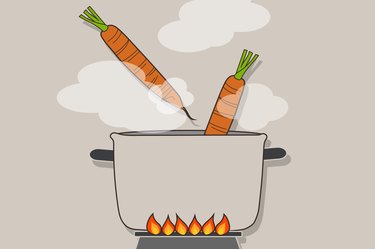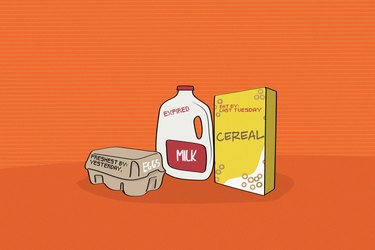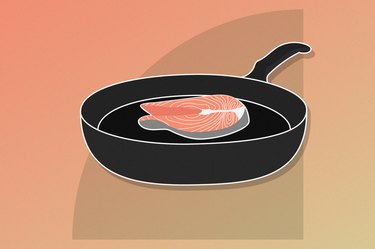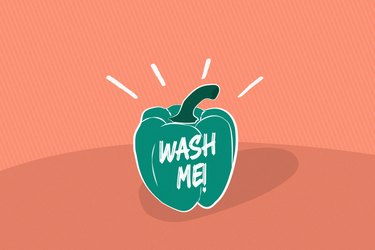
Cooked vegetables are often more pleasant to eat than raw vegetables and they may be easier for your body to digest, but it's true that cooking vegetables changes their nutrient content. For some veggies, cooking them can make the nutrients more available. Other times, you lose nutrients in the process. This depends on the cooking method.
For example, many people wonder if boiling vegetables is healthy, and which ways of cooking them are best for nutrient retention.
Video of the Day
Boiling vegetables, in particular, is associated with reduced nutrient availability, but that doesn't mean you should stop doing it altogether. Here, we discuss the drawbacks of boiling veggies, what you can try instead and when it's totally fine.
Tip
Vegetables are an important part of a balanced diet, so you should figure out a cooking method that works for you. The 2020-2025 Dietary Guidelines for Americans recommend two to four servings of veggies per day, depending on how many calories you eat.
This includes dark green vegetables, red and orange vegetables, legumes and starchy vegetables, which can be rotated on a weekly basis for a nutritious diet.
Are Boiled Vegetables Healthy?
No matter which way you cook your veggies, their nutrient content will likely change. "The question of whether or not you should boil vegetables is not a simple yes or no, and depends on some different factors," says registered dietitian Sarah Schlichter, RDN. "Any form of cooking will likely cause changes in the contents of vitamins."
One factor to consider, Schlichter says, is whether the vegetable you're cooking has fat- or water-soluble nutrients in it. Water-soluble vitamins — like vitamin C and B vitamins like folate, thiamine, riboflavin, pantothenic acid and so on — dissolve in water, according to the National Cancer Institute. That means that during boiling, these nutrients will leech out into the water and the veggie will retain less of them after cooking. Vegetables rich in water-soluble vitamins include mushrooms, sweet potatoes, spinach, broccoli and bell peppers.
Boiling removed more water-soluble vitamins like vitamin C than any other cooking method from vegetables like broccoli, chard, potatoes, sweet potatoes, carrots, spinach and zucchini, during one April 2018 study in Food Science and Biotechnology.
Interestingly, though beta-carotene (a precursor to vitamin A) isn't water-soluble, the study also found that boiling lowered the beta-carotene found in carrots. The researchers suggest that this is probably due to the high temperature of boiling water, as beta-carotene is heat-sensitive.
When Boiling Works
Boiling is usually the worst offender when it comes to reducing the nutrients in veggies. That being said, some experts say there may be times when boiling your vegetables is just fine.
"Boiling vegetables causes some water-soluble vitamins to leach into the water, which typically gets discarded when draining," says registered dietitian Mackenzie Burgess, RDN. "But, if you are boiling vegetables in water or broth that will be used in soup, this isn't a concern because you'll still be taking in the vitamins from the liquid."
One of the perks of boiling vegetables is that it requires no additional fat when cooking, which may be a more nutritious option for some. Boiling is a great cooking method for anyone trying to reduce fats, such as vegetable oils, in their diet.
When to Choose Another Cooking Method
"Boiling vegetables does use the least amount of fat," Schlichter says. "But, fat is necessary for the absorption of fat-soluble vitamins, such as vitamins A, D, E and K." Cooking with fats like avocado oil may actually enhance nutrient absorption and offer a myriad of other health benefits.
Some cooking methods, such as using the microwave, are faster and more convenient, though some have safety concerns about this. The truth is, microwaving vegetables might be one of the more nutritious ways of preparing them because of the short cooking time, according to Harvard Health Publishing.
And when you're dealing with vegetables rich in water-soluble nutrients, such as vitamin C and B vitamins, you may want to skip boiling them. These vitamins may be significantly reduced when you boil your veggies, so try steaming, sauteing or roasting instead.
Cooking Methods to Preserve Nutrients
While boiling is convenient, it's possible to simplify your veggie prep using other cooking methods that retain nutrients. "Generally, methods that use the minimum temperature, the minimum amount of water and the least amount of time will retain the most nutrients," Schlichter says.
Other ways to cook vegetables besides boiling them include:
- Microwaving
- Steaming
- Stir-frying
- Roasting
- Air-frying
- Sautéeing
So, How Bad Is It Really to Boil Vegetables?
It's true: Boiling your veggies might cause them to lose some of their nutrient content, especially when compared to other cooking methods, like sauteing and microwaving, which tend to retain more vitamins and minerals.
That being said, if boiling is your preferred method of preparing veggies, it's not necessary to avoid it at all costs."Boiling vegetables is a much better option than not eating vegetables at all," Schlichter says.
If you're in a pinch, boiled vegetables will do. If you have a bit more time, try a vegetable steamer.
- U.S. Department of Agriculture: "2020 - 2025 Dietary Guidelines for Americans"
- Food Science and Biotechnology: “Effect of different cooking methods on the content of vitamins and true retention in selected vegetables”
- National Cancer Institute: “Definition of water-soluble vitamins”
- Colorado State University Extension: “Fat-Soluble Vitamins: A, D, E, and K”
- Harvard Health Publishing: Microwave's impact on food



